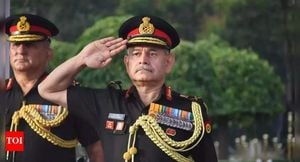Post-election violence has turned Mozambique's political climate upside down, with the country facing widespread protests following allegations of election fraud. The unrest has attracted attention not just within its borders but also from neighboring countries and international observers.
The situation escalated significantly after the October 9 election, when the ruling party, Frelimo, declared its candidate, Daniel Chapo, the winner, citing over 70% of the vote. This announcement, made by the National Electoral Commission, has faced fierce rejection from opposition parties who claimed voter fraud, including the stuffing of ballot boxes, and other irregularities, causing doubt over the legitimacy of the results.
Since the election, Mozambique has seen daily protests, particularly from supporters of the opposition, led by Venancio Mondlane of the Podemos party. Communities across the capital, Maputo, erupted with anger, constructing barricades and setting fires. The police responded with tear gas and rubber bullets, leading to violent confrontations. Reports from health officials indicate the unrest has cost at least 21 lives, with many activists and demonstrators expressing fears for their safety amid rising tensions.
Frelimo, which has maintained power since Mozambique's independence from Portugal in 1975, is no stranger to accusations of election rigging. The party's hold is characterized by disputes over electoral integrity, and this current unrest is merely the latest chapter.
Footage from protests shows angry citizens demanding accountability and justice, chanting slogans against the government and the election results. Observers note the growing frustration among the populace, which has yet to abate. One eyewitness recounted seeing demonstrators being fired upon by police, creating scenes of chaos as people sought shelter and safety.
Over recent days, authorities have tightened security measures, deploying soldiers to maintain order. Mozambique's armed forces spokesperson, Gen. Omar Saranga, addressed the press, emphasizing the military's role to support the police. This statement followed discussions about government directives on handling protests and demonstrators. "Our duty is to keep the peace, especially during such uncertain times," Saranga stated.
Adding to the severity, the Southern African Development Community (SADC) has indicated it will address the political crisis at its upcoming summit, reflecting the international community's unease. Meanwhile, South Africa, wary of the turmoil spilling across borders, has temporarily shut down the Lebombo border crossing, intensifying border patrols and reinforcing their security measures as protests continue. This closure targeted the significant volume of Mozambicans returning from South Africa, drawing lines of vehicles and travelers on both sides.
Back within Mozambique, Mondlane’s absence during planned demonstrations fueled speculation and disappointment among his supporters. Although he initially called for mass gatherings to show strength against the government, he failed to show up, leaving many to question his commitment. His supporters reported feeling abandoned, with some demonstrations falling short of expected attendance. Mondlane later claimed through social media he received advice from followers to remain out of sight for safety reasons. "The people told me to stay where I am," he said, pointing to the volatility of the situation.
The election aftermath has drawn criticism from multiple corners, with international organizations reporting serious concerns over the transparency of the electoral process. Some rights groups have reported on the police's use of excessive force during protests, claiming many have faced unjustified arrests and violent treatment. Further complicity arises from the murders of two high-profile political figures who were linked to the opposition, intensifying fears within those opposing Frelimo's rule.
Now as demands for retaining electoral transparency and justice grow louder, the future of Mozambique hangs precariously between the government's effort to quell dissent and the unyielding call for change and recognition of the vote count. The electoral council's eventual validation of results is still pending, with citizens anxiously waiting to see whether the status quo will persist or if their voices will finally spur some long-awaited change.
The events of the past weeks signal not just dissatisfaction but also the inevitable clash between the ruling parties and the populace eager for reform and transparency. With fingers crossed, many are hoping this unrest might lead to significant political shifts and perhaps, eventually, to new leadership or governance styles more reflective of the will of the people.



